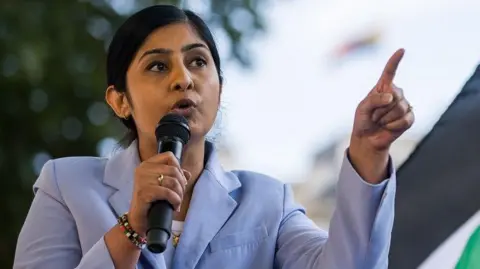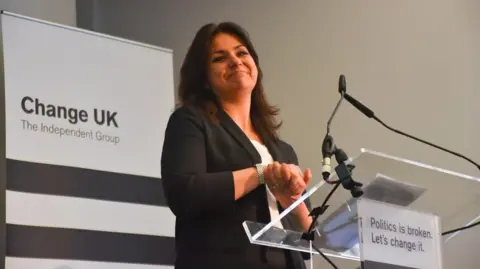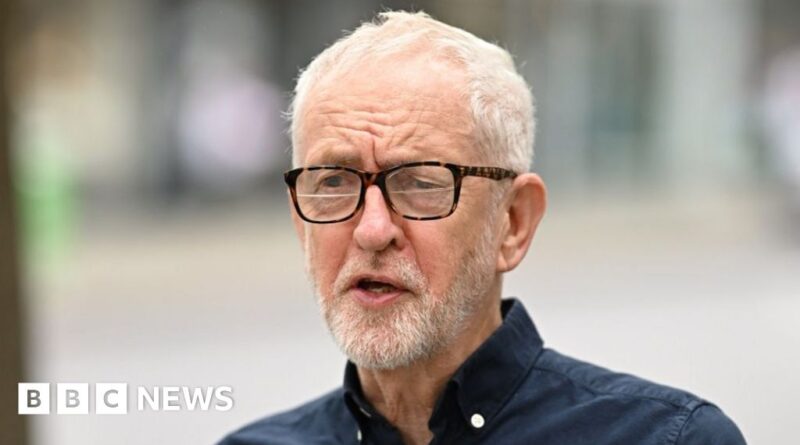Jeremy Corbyn's new party needs a name and it's trickier than you might think
Political reporter
The first thing anybody wants to know when a new political party is launched is what it’s going to be called.
But Jeremy Corbyn has decided to do things differently.
The former Labour leader claims more than 600,000 people have registered as supporters for the new left-wing party he is setting up with fellow independent and ex-Labour MP Zarah Sultana.
It is, so far, a party without a name.
Initial reports that it was going to be called Your Party – because that’s what the sign-up website is called – were quickly shot down by Sultana.
She has said she thinks The Left or the Left Party would be a good title for the new venture.
But the pair have said they want supporters to come up with a name, as part of their debate on what the new party will stand for.
They will not be able to put forward candidates for election until they have registered a name with the Electoral Commission, which has strict rules about not copying other parties’ names or sounding too much like them.
But, apart from that, supporters have a blank canvas.
“The name should sum up in one simple phrase the pure essence of what the party is all about,” says Sheffield University’s Prof Matthew Flinders.
The time is also ripe for a political party named for the modern world, he says.
Prof Flinders argues the mainstream parties’ brands were forged in different times and “most young people don’t really understand what Labour means, or Conservative”.
“The especially don’t know what Liberal Democrat means.”
Whereas parties were once sustained by local branch or social meetings that has “eroded in a digital age, making the relationships thinner and putting more pressure on name and brand recognition to resonate with voters”, Prof Flinders says.
In the commercial world, brand names are everything.
“There’s a lot of power in a name and if you can clearly convey your point of view and use those words effectively it does a lot of work,” says Laura Rogers, an executive creative director at advertising agency AMV BBDO, which counts retailer Currys and charity the RSPCA among its clients.
The sweet spot, she argues, is something that works well for sharing online and sells well as “merch”.
Get the wrong name and you risk ridicule. Just ask the Post Office, which in 2001 wasted £2m to rebrand as Consignia, only to reverse course after the baffling name became a laughing stock.
A new political party must also be alive to the risks of social media that loves to turn everything into punchlines.
“Make sure the first three letters don’t spell a bad word,” warns journalist Ash Sarkar of the left-wing media site Novara Media.
“Like the word assembly can very easily be changed to ‘ass’.”
While this may seem flippant ,”People experience and understand politics through the content they share online”, Sarkar says.
Allowing the general public to name a party would have been a disaster, leading to “Party McPartyface” says Sarkar – referencing the time Boaty McBoatface won a public poll to name a £200m polar research ship.
Dominic Bailey, co-founder of branding and design agency Baxter and Bailey, thinks Corbyn’s decision to ask supporters for names is a clever stunt that has created buzz and a sense of ownership for those signing up.
“It also really fits with his brand to be social and democratic with the choice of name,” Bailey says.
“But being democratic in naming and design doesn’t make a whole lot of sense,” he warns.
 Getty Images
Getty ImagesPolitical history is littered with cautionary tales for new parties trying to make a name for themselves.
The Electoral Commission website shows a new party is registered almost every week in the UK, and most fade without making an impact at a national level.
Even when a party launches with 11 MPs and a national profile they can collapse without ever really defining themselves – like The Independent Group (TIG), which launched at the height of the Brexit deadlock in 2019 as an avowedly centrist, pro–European Union political party.
The party only lasted ten months but changed its name twice, first to Change UK and then to The Independent Group for Change after petitions website Change.org threatened to sue over the name.
Heidi Allen, the ex-Tory MP who was the first leader of Change UK, recalls her party became “lost in admin”, sapping the fledgling movement of oxygen.
Choosing a name that speaks to your message and is not already taken by another political group of business is “trickier than you think”, says Allen.
 Getty Images
Getty ImagesPamela Fitzpatrick, who runs the Peace and Justice Project with Corbyn, registered a party last month named “Arise” – a name drawn from one of Corbyn’s favourite poems.
But political strategist and pollster Chris Bruni‑Lowe, who has written a book on the history of politic slogans, would advise against using Arise as the new party’s name.
“Vague or overly poetic names will underperform, especially if the party is meant to be a corrective force,” he says.
Researching his book, Bruni-Lowe says he found “voters don’t reward wordplay – they reward clarity and conviction”.
A name must also be “clear” rather than “clever”, he says.
And the most effective political brands “offer a vision or mission, not just an organisational label” and use “the electorate’s own language and frustrations”.
Corbyn has insisted the final decision will only come after “all the responses” are in. The plan is to settle on a name at the party’s founding conference, in the autumn.
But the discussions around the name are just a distraction, says Sarkar.
Westminster tends to “hyper-fixate on things that don’t really matter”, she argues.
“It’s not going to live or die based on a name,” insists Sarkar. “It will live or die based on its political strategy.”
“The fact that 600,000 people have signed up to the new Corbyn project with no name is an answer to the question on how much the name matters,” she adds.
In a message to supporters on Friday, the party with no name said: “Make no mistake: whatever the name, it is always going to be your party.”






